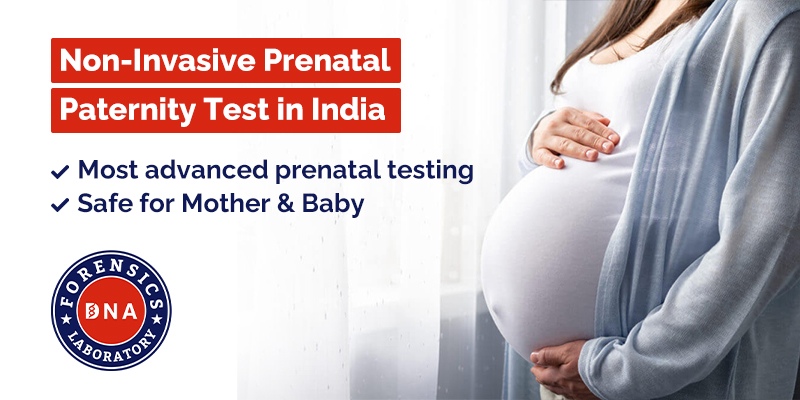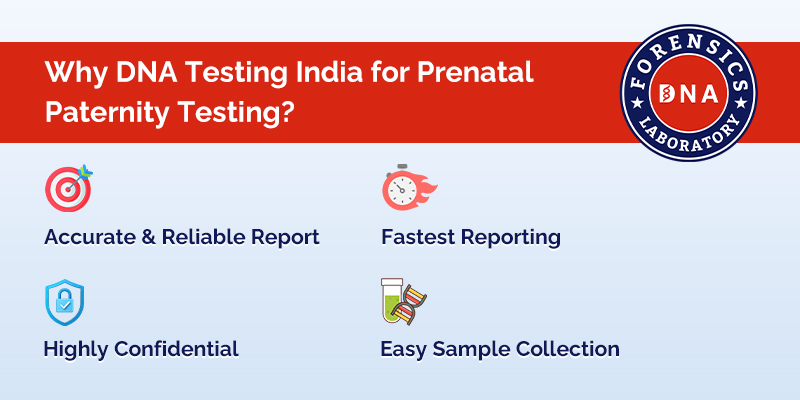 Pregnancy is an emotional and significant journey in a woman’s life. It’s a moment filled with happiness & excitement for the arrival of a new family member. However, in certain cases, doubts may arise about the biological identity of the father. When such queries impact legal rights, family connections, or emotional clarity, the prenatal paternity DNA test becomes an invaluable tool. Today, thanks to scientific advances, it is possible to determine paternity even before the child is born. This is made possible via the non-invasive prenatal paternity test or NIPP*, which is gaining popularity across the nation.
Pregnancy is an emotional and significant journey in a woman’s life. It’s a moment filled with happiness & excitement for the arrival of a new family member. However, in certain cases, doubts may arise about the biological identity of the father. When such queries impact legal rights, family connections, or emotional clarity, the prenatal paternity DNA test becomes an invaluable tool. Today, thanks to scientific advances, it is possible to determine paternity even before the child is born. This is made possible via the non-invasive prenatal paternity test or NIPP*, which is gaining popularity across the nation.
*This test doesn’t involve the sex determination of the child.
What is a Prenatal Paternity DNA Testing?
Prenatal paternity DNA testing is used to determine whether a man is the biological father of a child before the baby is born. This is especially helpful when there are uncertainties or disputes regarding paternity during pregnancy. This type of test is conducted non-invasively, meaning it does not harm the mother or the unborn baby.
In India, these tests are done under strict rules and are carried out by our lab, which is an expert in DNA testing.
How is the NIPP performed?
- Blood Sample from the Mother – A small sample of the mother’s blood from the venous is collected. This sample contains fragments of the baby’s DNA.
- Buccal Swab from the Alleged Father – A swab is taken from the inside of the alleged father’s cheek to collect his DNA.
- DNA Matching Process – Scientists then analyze and compare the baby’s DNA (from the mother’s blood) with the alleged father’s DNA to determine a match.
In non-invasive tests, no needles or syringes are inserted into the womb, ensuring complete safety and comfort for the mother. Therefore, this test poses no risk to the mother or the unborn child, making it the most preferred method for prenatal paternity DNA tests in India.
Why is Prenatal Paternity Testing Needed?
There are several reasons why you may choose to get a DNA test while pregnant:
- Legal Issues – To support legal claims such as inheritance rights, custody disputes, or dependent immigration benefits.
- Relationship Clarity – To resolve uncertainties about paternity in a relationship and make informed decisions.
- Emotional Assurance – For personal peace of mind during times of doubt.
Whatever the reason may be, this test can provide clear and accurate results with high certainty when confirming paternity.
Key Benefits of Non Invasive Prenatal Paternity Testing
- Accurate – Provides high accuracy in determining paternity.
- Early Testing – Can be conducted as early as the 9th week of gestation.
- Fast Results – Results are typically available in 8-9 working days.
- Legal Use Available – With proper court permissions, these tests can be used for legal matters.
- Safe and Risk-Free – No need for amniocentesis, i.e.,e inserting needles in the womb or other risky procedures.
Availability of Prenatal Paternity DNA Testing in India
Thanks to the advancement of genetic science and healthcare infrastructure, prenatal paternity DNA testing in India is now accessible in most major cities. At DNA Forensics Laboratory Pvt. Ltd. (DFL), we provide non-invasive prenatal paternity testing services with proper support and guidance. It’s important to choose us because we have skilled experts and advanced labs to make sure the test is accurate and legally valid. We also offer home sample collection, maintaining your privacy and convenience.
Why Choose DNA Forensics Laboratory Pvt. Ltd.?
At DNA Forensics Laboratory Pvt Ltd., we are one of the leading companies for DNA testing services. Following are reasons why you should choose us for a prenatal paternity DNA test in India:
Safe & Non-Invasive Testing – We use the non invasive prenatal paternity test, which is completely safe for both the mother and the unborn child. This test requires only a small blood sample from the mother & a buccal swab from the alleged father. There is no need to touch or disturb the fetus, making it 100% risk-free and painless.
Accurate and Reliable Results – We use the latest technology and equipment to perform DNA tests. Our non invasive prenatal paternity testing provides high accuracy in confirming biological relationships. We follow strict international testing standards, ensuring reliable and trustworthy results every time.
NABL Accredited & Legally Valid – We are a NABL-accredited and ISO-certified company, which means all test procedures meet the highest quality standards. In legal cases, our reports are accepted by Indian courts, government agencies, and embassies. So, whether it’s for peace of mind or legal matters like child custody or inheritance, you can depend on our reports.
Fast Turnaround Time – Time matters when you’re expecting your baby. We understand this and provide fast reports within 8–9 working days.
Strict Confidentiality – Privacy is a major concern when it comes to prenatal DNA testing. We kept your personal information and test reports confidential. No data is shared with third parties without your written consent. From sample collection to result delivery, everything is handled with complete privacy and professionalism.
Nationwide Sample Collection Network – We have 400+ collection centres in India and abroad. If you are unable to visit a center, we also provide home collection services, making the process more comfortable for expecting mothers.
Expert Team of Scientists – DFL is backed by a team of highly qualified geneticists and forensic experts who work together to deliver precise and dependable results. We understand both the emotional and legal aspects of paternity testing and provide full support to help you through the entire process.
Transparent and Competitive Pricing – The cost of prenatal paternity testing can vary depending on the case, but DNA Forensics Laboratory maintains a transparent pricing policy. There are no hidden charges, and all the costs are clearly explained to you in advance. While the non invasive prenatal paternity testing is slightly more expensive than regular tests, we ensure full value for your money by offering accurate, fast, and safe testing.
Court-Admissible Reports – In many cases, this test is needed for legal matters. DFL makes sure that, if needed, your test can be done with proper legal steps so that the report is accepted in court. This is especially important in cases of child custody, divorce, maintenance, or property disputes.
For more information or to book Prenatal Paternity DNA Testing in India, call our executives at +91 8010177771 or WhatsApp us at +91 9266615552.






